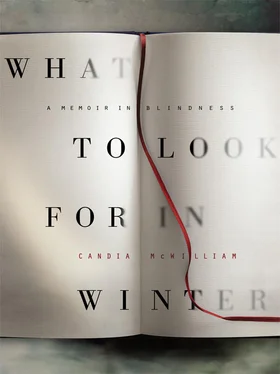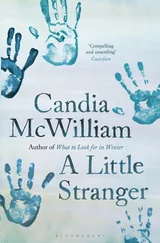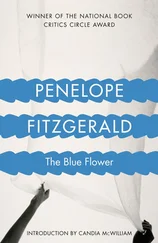Aunt Mickey had worked at Bletchley Park, was widowed young, and lost both her older son and only grandson. For the weeks before my marriage to her nephew, she mothered me at St James’s Palace where the family lived when they were in London. It was at lunch on one of these pre-nuptial days that I learned that one must not cut the nose off a piece of Brie; to do so is called ‘nosing’, as in, ‘My dear, you’ve nosed the Brie’. It was at Aunt Mickey’s table during this astounding week that I looked into the bluest eyes I have ever seen up close, those of Clementine Beit.
Of course she was a Mitford. I fear blue eyes. I like them and I fear them. They freeze the mongrel in me that expects to be whipped.
I must here say something of Aunt Mickey’s brother, Quentin’s father Nol (Oliver) Lymington, my father-in-law. Nol had badly wanted to be a doctor but it was not felt that this was suitable to his station. He was a sweet man, with beautiful legs that he has passed to his son and grandsons. He was frail after a bout of TB and a long stay in Midhurst TB hospital. I am not sure that he received many visitors there, though I know that Mickey was a champion sister to him. He had a wide selection of talents. Towards the end of his shockingly short life, he apprenticed himself to Bill Poon, of Poon’s Chinese restaurant in Soho. Bill Poon was said to be descended from the man who invented the stock cube. Nol came away with a magnificent certificate from Bill Poon, certifying in cursive black ink that ‘Viscount Lee-Min-Tong’ had completed, with distinction, his cookery course. And so he had.
At this point Nol was living with us and I was pregnant: so were many of my friends who lived near us in Hampshire. Nol cut no corners and found every last elephant’s-ear fungus in the stores he haunted in Soho and gave us girls weekly lessons of such detail and panache.
After Chinese food, there was a lull; maybe it was in this lull that he produced my yellow retriever pup Guisachan, dropping her on to my bed as I slept after giving birth to Clementine. The next phase was altogether more esoteric and demanding; Nol became an apprentice chocolatier. He joined the University of the South Bank and learned a tremendous amount about the temperatures at which chocolate is shiny, less shiny, not shiny at all, completely screwed up and so on. He purchased a white overall and he worked in beautiful white gloves. There was nothing he could not do and boxes of chocolates so complex and so pretty that it was impossible to imagine eating them started to appear at family occasions. Nol was the most patient enrober, glosser, crystalliser, ganache-maker and praline-crackist. At this stage in his life he had not yet separated from his third wife. They lived in a house of airy elegance with a parrot named Albert, who had plucked off all the feathers save those on his head, so that Quentin would say he looked oven-ready, and three wire-haired dachshunds named Charlotte, Anne and Emily. The minute precision required by chocolate technology was a challenge to domestic and marital life and it was perhaps a manifestation of their internal schisms when forty-five gallons of enzyme for making soft centres turned up in a drum on the doorstep. Each chocolate requires but one drop.
Nol would have made a good teacher and, in happier times, he could have been an intimate and loving parent and grandparent, had his heart spared him.
The night before our wedding day, I lay in Aunt Mickey’s elder daughter Angela’s maiden bed in St James’s Palace and prayed. I do not remember sleeping though I must have. I remember quantities of indecisive, pleasant February rain falling and the wide view from my window over the sentry box and up St James’s Street. In a box in the cupboard were my white suede shoes, size six, in which I was to walk into my future.
Quentin and I moved to London, renting a house in the Portobello Road, because his bachelor house in London had been set fire to by an arsonist — an episode terrifyingly and more extensively described in Janet Hobhouse’s novel The Furies .
I am incapable of thinking about this with any precision. It occurred around the time of Oliver’s birth. I hardly know about it save through fiction. Quentin had lent his house off Westbourne Grove to Janet when she casually mentioned that she had nowhere to live on a visit to us that snowy winter of Olly’s birth. Janet was living there and lost the manuscript of a book that she was writing on Braque in that fire. Thank God she did not lose her life, though that too was early extinguished by the cancer that drives The Furies into being the stupendous novel it is.
The arsonist had seen Quentin’s car and formed an idea of us for which he evidently did not care. He made a pyre of everything moveable in the house, which was not a great deal, poured petrol over and lit it. Both Quentin and I have, with increasing reason, a deep horror of fire.
During our time in the Portobello Road, Oliver learned to turn somersaults and his sister was conceived. I would not mention this did she not like the idea; it has remained ‘her’ part of London.
While I was expecting Oliver, Quentin himself had been at sea for a good deal of the time, completing his own private circumnavigation on his ketch Ocean Mermaid . Quentin is one of the few people in the world who is entitled to wear the tie of the Association Internationale Amicale des Captains de Longs Cours Cap-Horniers. That is, he has been around Cape Horn, more than once, under sail. To attend the meetings of this society even as an appendage is a privilege. On one occasion, I was lucky enough to see a film made on a full-rigged tea clipper when one of the nonagenarians present had been just a boy holding on for dear life to a spar as the great ship rounded the Horn. No soundtrack, but you read the sails.
Quentin can name the stars and navigate by them. He can find land using dead reckoning. He stopped hunting after his mother’s death and took it up again the day it was made illegal. He has a passion for justice, a tenderness for the underdog, and a mind that works patiently and logically through to the bone of the problem. There is something of Plantagenet Palliser to him. He is quiet, but when he speaks, he has a beautiful voice.
When Clementine was born, Aunt Mickey presided once more like a more worldly angel of maternal lore, and Nanny Ramsay came too. We had a new house to move into, an estate house just beyond the gates of Farleigh House where the school still festered. Clementine had expressively conversational hands and was a very slow eater. She decided not to breastfeed and very early conquered her larger brother, who referred to her as ‘Birdy’ until her birth and was her subject in love as soon as he saw her. He would stand with his feet tucked into the bars of her cot and loom over her, shedding a shadow that was bright orange at the top where the sun fell upon it. They were, and are, each other’s stalwart best defender.
After the birth of Clem, the health visitor suggested that I might like to get out of the house a bit and do some A levels with a view to gaining some qualifications — and perhaps some other ‘interest’. I was reading avidly, though that is not invariably deleterious to the raising of happy and balanced children, and both children seemed to be flourishing. I was one of the first people to read Midnight’s Children . As well as the seethe of the book, I liked the look of the thin, modest, exhausted author. Shrewd of me, if not precisely prophetic.
Things between Quentin and me had shifted and held us apart at an undeclared pitch of difficulty. We could not find the words with which to row our way to safety, then found the wrong ones. Not for the first time I lit upon escape as a solution. My father wrote me a, for him, unusually direct letter of concern. It suggested that although powerfully drawn by temperament to Italy, he had come to place a higher value on the aesthetics of the Dutch School. He loved Quentin.
Читать дальше











